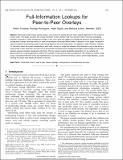Full-Information Lookups for Peer-to-Peer Overlays
Author(s)
Rodrigues, Rodrigo; Gupta, Anjali; Fonseca, Pedro; Liskov, Barbara H.
DownloadFonesca_Full-Information-Lookups.pdf (1.076Mb)
PUBLISHER_POLICY
Publisher Policy
Article is made available in accordance with the publisher's policy and may be subject to US copyright law. Please refer to the publisher's site for terms of use.
Terms of use
Metadata
Show full item recordAbstract
Most peer-to-peer lookup schemes keep a small amount of routing state per node, typically logarithmic in the number of overlay nodes. This design assumes that routing information at each member node must be kept small so that the bookkeeping required to respond to system membership changes is also small, given that aggressive membership dynamics are expected. As a consequence, lookups have high latency as each lookup requires contacting several nodes in sequence. In this paper, we question these assumptions by presenting a peer-to-peer routing algorithm with small lookup paths. Our algorithm, called ldquoOneHop,rdquo maintains full information about the system membership at each node, routing in a single hop whenever that information is up to date and in a small number of hops otherwise. We show how to disseminate information about membership changes quickly enough so that nodes maintain accurate complete membership information. We also present analytic bandwidth requirements for our scheme that demonstrate that it could be deployed in systems with hundreds of thousands of nodes and high churn. We validate our analytic model using a simulated environment and a real implementation. Our results confirm that OneHop is able to achieve high efficiency, usually reaching the correct node directly 99 percent of the time.
Date issued
2008-10Department
Massachusetts Institute of Technology. Computer Science and Artificial Intelligence LaboratoryJournal
IEEE Transactions on Parallel and Distributed Systems
Publisher
Institute of Electrical and Electronics Engineers
Citation
Fonseca, P. et al. “Full-Information Lookups for Peer-to-Peer Overlays.” Parallel and Distributed Systems, IEEE Transactions on 20.9 (2009): 1339-1351. © 2009 IEEE
Version: Final published version
ISSN
1045-9219
Keywords
routing protocol, peer to peer, network topology, distributed data structures, Routing protocols, Network topology, Distributed systems, Distributed data structures, Distributed applications